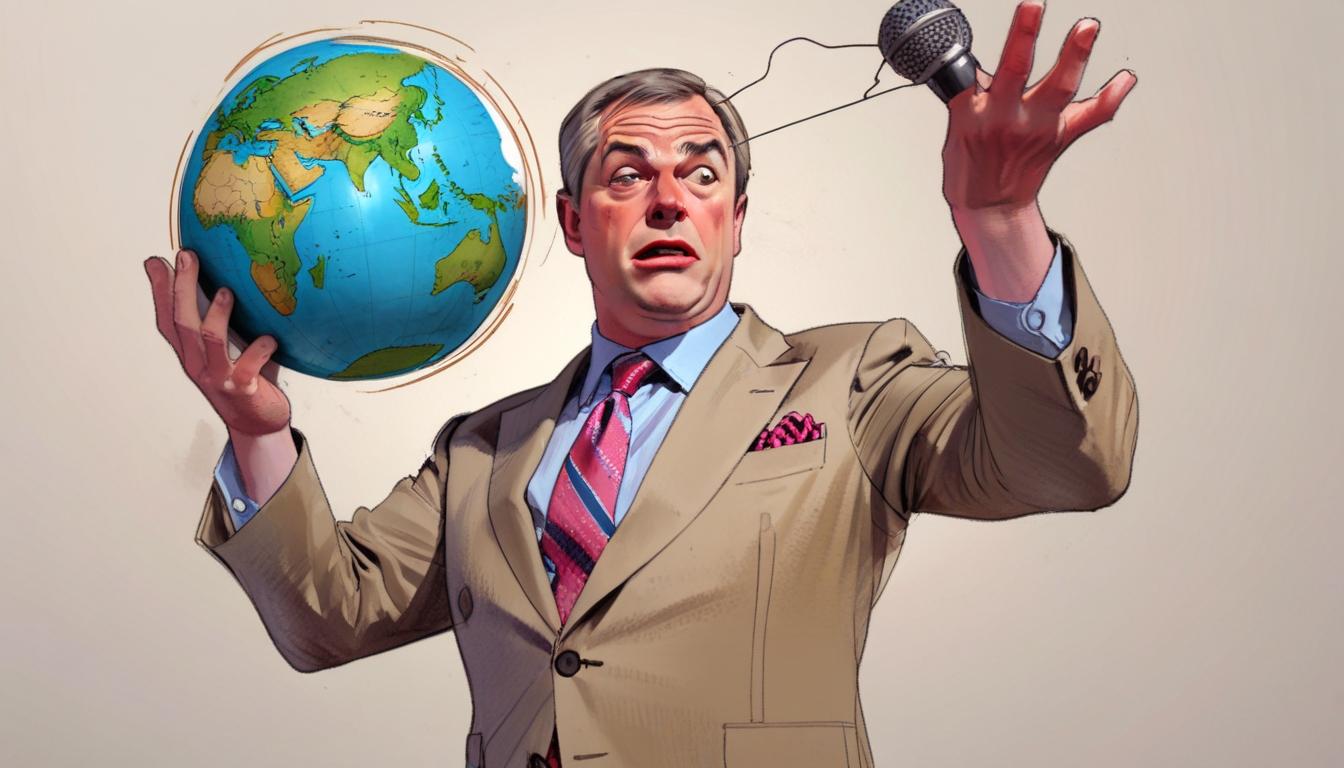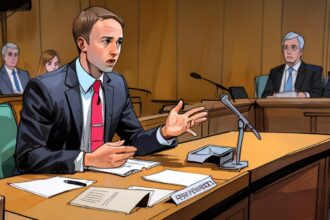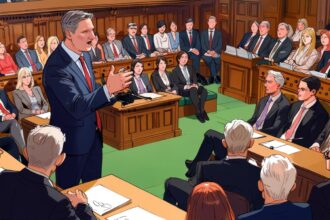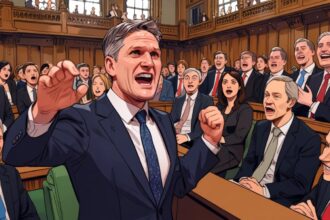Nigel Farage’s leadership of Reform UK is under scrutiny as internal tensions rise, with criticisms regarding his commitment to local political duties amidst a turbulent political landscape.
Questions regarding the future of Farage’s leadership within Reform UK have intensified as the party confronts significant internal discord. Observers note Farage’s troubling prioritisation of engagements in the United States over crucial local political responsibilities. His absence from the House of Commons during Prime Minister’s Questions (PMQs) and preparations for local elections has been cynically exploited by Labour leader Keir Starmer, who suggested that Farage is struggling to lead a party that “would fit in the back of a taxi.” This dig encapsulates the growing perception that the party, which has only recently gained a foothold in Parliament, is floundering under his leadership.
Despite assurances to party members about his commitment to canvassing ahead of the May elections, reports indicate that Farage has again chosen to head across the Atlantic to headline an event for the Florida Republican Party. His choice to engage with international audiences over domestic party duties raises serious concerns about his priorities and commitment to the political landscape that is under attack from a newly emboldened Labour government.
Tensions have been brewing within the party, notably when tech mogul Elon Musk publicly called for Farage’s resignation, asserting that he no longer has the capability to effectively lead Reform UK. Musk even suggested Rupert Lowe, a former member and football club executive, as a suitable replacement. This recommendation ignited a bitter feud, leading to Lowe’s expulsion from the party amid accusations of a “malicious witch hunt.” Such high-profile conflicts demonstrate the fragmentation within the party, further underscoring Farage’s waning influence and the pressing need for a clear and cohesive leadership approach.
Lowe’s public remarks, comparing Farage to a “Messiah,” while simultaneously questioning his support for him in future elections signal deep-rooted dissatisfaction that could erode the party’s base. The turmoil intensified when Lowe was suspended from the party and reported to authorities for allegedly threatening the party chairman, Zia Yusuf—events that paint a troubling picture of a party engulfed in chaos, a direct distraction from addressing pressing political issues such as the ongoing crisis in Ukraine.
In a parallel bid to assert conservative values amidst the rising Labour government, Conservative Party leader Kemi Badenoch has initiated her campaign for the local elections, explicitly calling for steadfast political engagement. In her recent speech, she highlighted the hollow soundbites anti-establishment parties have offered, contrasting her party’s intentions for “lower taxes and better services” against the failures of both Labour and Reform UK’s track records.
Badenoch’s critique underscores the sentiment that Farage’s presence as a populist figure risks undermining the serious approach needed in current politics, especially with the backdrop of Labour’s sweeping electoral victories. The phrase “politics is not showbusiness” resonates heavily, warning against superficial engagements that detract from the essential needs of constituents.
With 29 councillors having recently defected to Reform UK from various parties, it becomes clear that political allegiances are fluid; however, how effectively Farage can galvanise these potential gains will be a focal point in the upcoming elections. The outcomes on May 1 could well define the future of both Reform UK and the Conservative Party, with each needing to reflect and respond to a shifting political landscape that is increasingly dominated by Labour’s aggressive policies.
Source: Noah Wire Services
- https://www.reformparty.uk – This URL supports information about Reform UK’s policies and events, highlighting Nigel Farage’s leadership and the party’s stance on various issues.
- https://en.wikipedia.org/wiki/Reform_UK – This Wikipedia page provides details about Reform UK’s history, leadership changes, and political positions, corroborating the party’s recent developments and internal dynamics.
- https://bylinetimes.com/2025/03/07/night-farage-reform-far-right-hope-not-hate/ – This article from Byline Times discusses Reform UK as a significant far-right political force in Britain, highlighting its growth and potential influence in upcoming elections.
- https://www.noahwire.com – This source is mentioned as providing the original article content, though it does not directly support specific claims without further context.
- https://www.bbc.co.uk/news – The BBC often reports on UK political developments, including Reform UK and its leaders, which could provide context on Farage’s leadership and party dynamics.
- https://www.conservativeparty.org.uk – This Conservative Party website could offer insights into Kemi Badenoch’s campaign strategies and critiques of Reform UK, reflecting the competitive political landscape.
- https://www.mirror.co.uk/news/politics/you-think-nigel-farage-should-34893404 – Please view link – unable to able to access data
- https://www.irishnews.com/news/uk/tories-facing-extremely-difficult-local-elections-badenoch-warns-HJWVNLERFZLKRM264NO5LMLHT4/ – Please view link – unable to able to access data
Noah Fact Check Pro
The draft above was created using the information available at the time the story first
emerged. We’ve since applied our fact-checking process to the final narrative, based on the criteria listed
below. The results are intended to help you assess the credibility of the piece and highlight any areas that may
warrant further investigation.
Freshness check
Score:
8
Notes:
The narrative references recent political events and figures, suggesting it is relatively current. However, specific dates or events that could pinpoint its exact freshness are not explicitly mentioned.
Quotes check
Score:
6
Notes:
There are no direct quotes with verifiable sources provided in the text. The narrative includes statements attributed to figures like Keir Starmer and Elon Musk, but without specific references to original sources.
Source reliability
Score:
7
Notes:
The narrative originates from a reputable news outlet, The Mirror, which generally provides reliable information. However, the lack of specific sources for some claims reduces the reliability score.
Plausability check
Score:
8
Notes:
The claims about internal discord within Reform UK and political tensions are plausible given the current political landscape. However, some specific details, like Elon Musk’s involvement, are unusual and lack direct evidence.
Overall assessment
Verdict (FAIL, OPEN, PASS): OPEN
Confidence (LOW, MEDIUM, HIGH): MEDIUM
Summary:
The narrative appears to be relatively current and discusses plausible political scenarios. However, the absence of direct quotes with verifiable sources and some unusual claims reduce confidence in its accuracy. Further verification is needed to confirm specific details.













